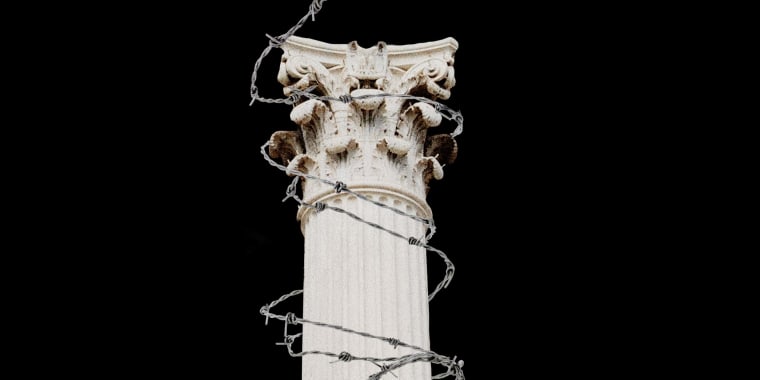It may be hard to tell, but the U.S. over the past two years has recorded its lowest incarceration levels in decades.
The exact reasons are hard to pinpoint, although experts believe prisoner releases during the pandemic and progressive criminal justice policies meant to stem mass incarceration are responsible. But recent Supreme Court rulings, and some that may be coming down the pipe next term, could threaten that trend and risk revving up the mass incarceration machine once again.
Recent Supreme Court rulings, and some that may be coming down the pipe next term, could threaten that trend and risk revving up the mass incarceration machine once again.
As conservatives on the Supreme Court methodically rescind civil rights that have been affirmed in the past century, they’re also giving states permission to drag the country to a bygone era. Unless progressives fight fervently, conservative-led states will turn the country into a land of legal tripwires where expressions of personal liberty like voting, choosing to protest, choosing when to be pregnant and choosing whom to have sex with are met with punishment.
And the people who righteously fight these laws may find themselves newly ensnared in the criminal justice system, feeding a very different era of mass incarceration authorized through conservative Supreme Court rulings.
We’ve already begun to see this possibility taking shape in states where so-called trigger laws banning abortion went into effect as soon as the Supreme Court overturned Roe v. Wade. Pregnant people have and will continue to defy abortion bans, because abortions are necessary, potentially life-saving procedures. And that means some states may soon be forced to decide whether to jail those who exercise their now-former right to bodily autonomy.
Republicans have also discussed revisiting bans on non-heterosexual relationships and interracial marriage, and the ruling on Roe proves those freedoms might be at risk, too. Progressives need to consider what mass resistance looks like and how to facilitate it while protecting people from the unjust legal systems they’re trying to dismantle.
More and more lately, I look to the post-Civil War “Black codes” as a model of the conservative movement’s goals. After the fall of the Confederacy, the codes created a patchwork of laws across various states that banned Black people from participating equally in democracy. The codes were designed to make Black people subservient and punish them if they stepped out of line — sometimes literally.
Here’s Capital University law professor Floyd Weatherspoon on the codes’ connection to mass incarceration and control:
[P]lantation owners sought state and local governmental officials to promulgate legislation and ordinances that would again bind African-Americans to plantations. The ultimate goal of the Black Codes was to place the slave owners and the newly freed slaves in the same position as before the Civil War—in a system of free labor and bondage
Today, we’re seeing another movement of bigoted white conservatives obsessed with the Confederacy. And they want to use laws to help them re-create a racial and gender hierarchy reminiscent of chattel slavery, even if they can’t revive the practice itself.
Conservatives largely oppose efforts to pass criminal justice reform and stem mass incarceration, and you can rest assured they won’t see any problem in filling America’s jails, prisons and courthouses with people who oppose their oppressive agenda. All the more reason progressives need a vehement — but careful and calculated — response to the far-right assault on democracy.

